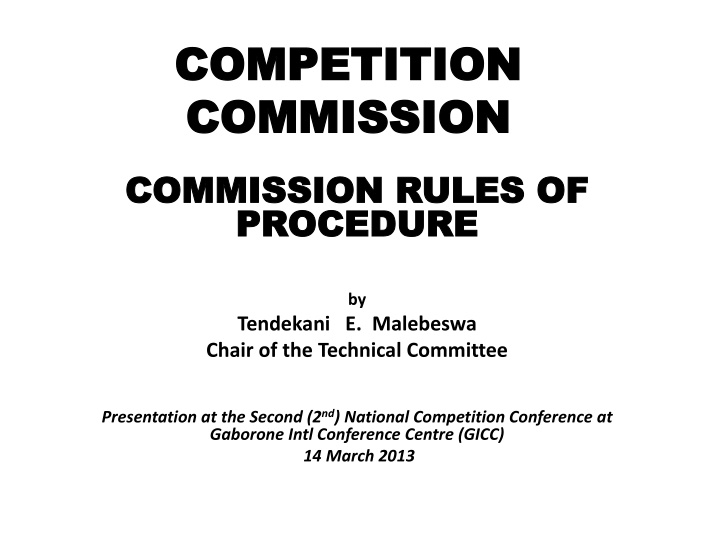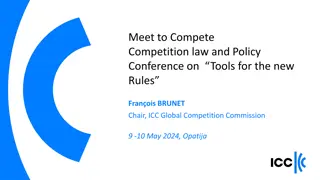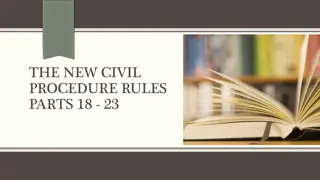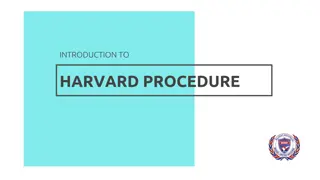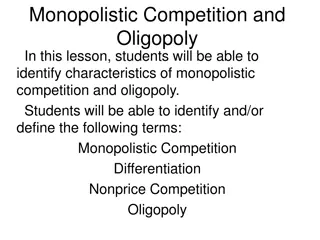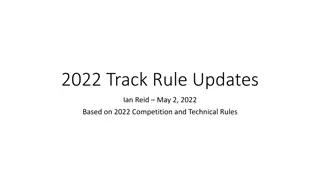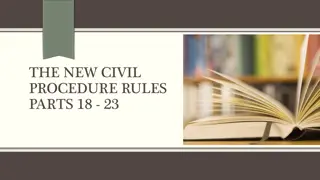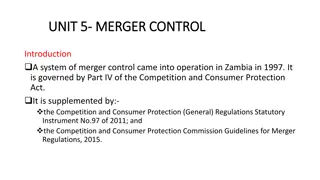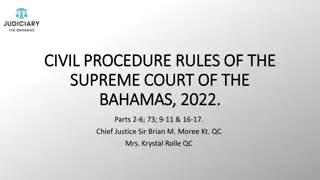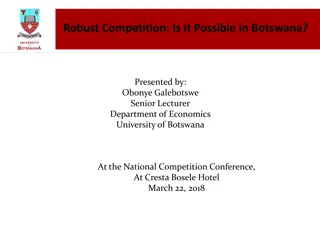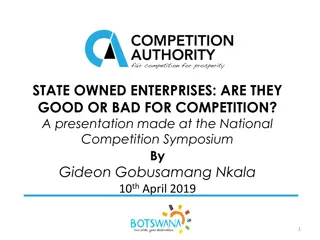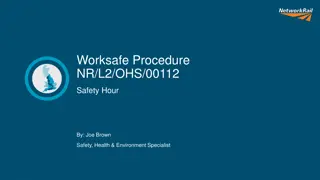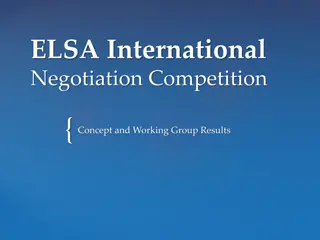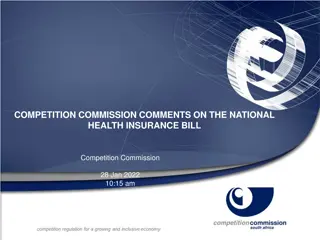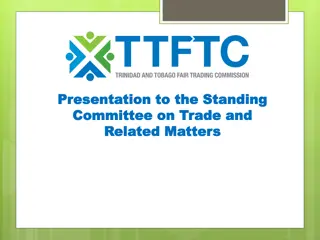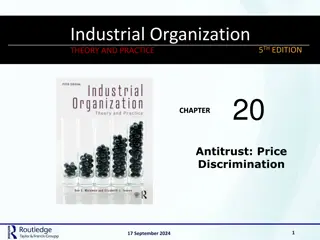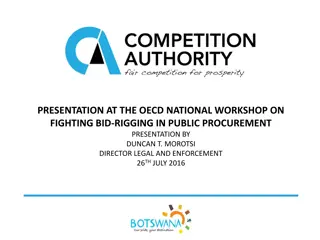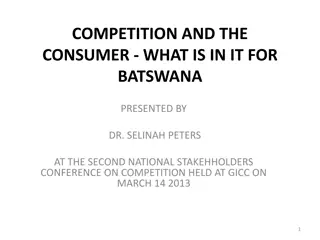Competition Commission Rules of Procedure Presentation at National Conference
Introduction to the Competition Act of 2009 and the establishment of the Competition Commission, outlining its adjudication powers and procedures. The presentation details the role of the Secretariat, document handling, complaint procedures, commission sittings, interim relief applications, third-party involvement, complaint withdrawal, and legal representation. It emphasizes the primary legal instruments guiding the Commission's adjudication process and the hierarchy of legal entities involved.
Download Presentation

Please find below an Image/Link to download the presentation.
The content on the website is provided AS IS for your information and personal use only. It may not be sold, licensed, or shared on other websites without obtaining consent from the author.If you encounter any issues during the download, it is possible that the publisher has removed the file from their server.
You are allowed to download the files provided on this website for personal or commercial use, subject to the condition that they are used lawfully. All files are the property of their respective owners.
The content on the website is provided AS IS for your information and personal use only. It may not be sold, licensed, or shared on other websites without obtaining consent from the author.
E N D
Presentation Transcript
COMPETITION COMPETITION COMMISSION COMMISSION COMMISSION RULES OF COMMISSION RULES OF PROCEDURE PROCEDURE by Tendekani E. Malebeswa Chair of the Technical Committee Presentation at the Second (2nd) National Competition Conference at Gaborone Intl Conference Centre (GICC) 14 March 2013
PRESENTATION OUTLINE 1. Introduction 2. Secretariat for Adjudication purposes 3. Documents and Communication 4. Complaint Procedures 5. Commission Sittings 6. Application for Interim Relief 7. Third parties, witnesses & interpreters 8. Withdrawal of Complaints 9. Conclusions 2
1. INTRODUCTION 1. INTRODUCTION The Competition Act No 17 of 2009 establishes the Competition Commission under section 9. It has powers to adjudicate on matters brought before it by the Competition Authority or any other party. In terms of section 16 of the Act, the Commission shall regulate its own proceedings, having the power to determine any matter of procedure for a hearing, with due regard to circumstances of the case. 3
INTRODUCTION contd The Commission is not enjoined to follow any formalised rules of procedure found in civil and criminal proceedings, but may condone any technical irregularities that may arise The primary legal instruments to be used by the Commission in adjudication are: The Competition Act of 2009 The Competition Regulations of 2011 Commission Rules of Procedure Any other Guidelines published by the CA 4
INTRODUCTION contd Parties can represent themselves without a lawyer - The legal process is as follows: Court of Appeal High Court Competition Commission Competition Authority 5
2. SECRETARIAT FOR ADJUDICATION PURPOSES Under the Act, the Chief Executive of the Competition Authority is appointed to be a secretary to the Commission Considering that the CA is an investigator and prosecutor before the Commission, and also be a defendant before the same organ, there was identified need to have a separate secretary for purposes of a fair adjudication process 6
2. SECRETARIAT FOR ADJUDICATION PURPOSES, cont d In this context, a neutral position of Registrar in the Rules was created The Registrar in relation to the Commission, means the Executive Secretary, or any other officer specifically appointed to that position; The Commission has since designated an officer within the CA to perform the functions of Registrar 7
3. DOCUMENTS & COMMUNICATION Under PART 3 of the Rules, documents to the Commission may be delivered in any of the following manners: By registered post or courier addressed to the Registrar; or By handing the document or a computer disc, memory stick or other media containing the document in an electronic form to the Registrar. 8
3. DOCUMENTS & COMMUNICATION contd Under Rule 5, if the Act or the Rules require the Commission to issue a document (a)the document will have been issued by the Commission when it has been signed by the Registrar, and served on any person to whom it is addressed; and (b) the document may be signed and served any time of the day. 9
3. DOCUMENTS & COMMUNICATION contd Rule 7 introduces fees as follows: (1)The fee for filing an initiating document is P250.00 (2)The Registrar may charge a fee for making a copy of a document in the possession of the Commission. Under Rule 10, any person, upon payment of the prescribed fee of P100.00, may inspect or copy any Commission non-confidential information. 10
4. COMPLAINT PROCEDURES Under Rule 11 (1) A complaint referral may be filed - (a) by the Authority in terms of section 39 of the Act or in Form I of Regulation 14(4) of the Competition Regulations; (b) by a complainant in terms of section 39(6) of the Act or in Form I of Regulation 14(4) of the Competition Regulations; or (c) by any other party to an action in a Court that has been referred to the Commission in terms of section 71(1) (a) of the Act. 11
4. COMPLAINT PROCEDURES contd Under Rule 13, an Answer must be given (1) Within ten (10) working days after being served with a complaint referral filed by the Authority. Any respondent who wishes to oppose the complaint referral must - (a) serve a copy of their answer on the Authority; and (b) file the answer with proof of service. (2) Within ten (10) working days after being served with a complaint referral filed by a person other than the Authority, a respondent who wishes to oppose the complaint referral must - . 12
4. COMPLAINT PROCEDURES contd (a)serve a copy of their answer on the Authority, on the person who filed the referral, and on any other person who has previously filed a complaint referral in that matter; and (b)file the answer with proof of service. An answer that raises only a point of law must set out the question of law to be resolved. Any other answer must be in affidavit form, setting out in numbered paragraphs - 13
4. COMPLAINT PROCEDURES contd (a)a concise statement of the grounds on which the complaint referral is opposed; (b)the material facts or points of law on which the respondent relies; and (c) an admission or denial of each ground and of each material fact relevant to each ground set out in the complaint referral. 14
4. COMPLAINT PROCEDURES contd An allegation of fact set out in the complaint referral that is not specifically denied or admitted in an answer will be deemed to be admitted - Rule 13(4) In an answer, the respondent must qualify or explain a denial of an allegation, if necessary in the circumstances Rule 13(5) Reply to an Answer by Affidavit may be made within 10 working days where the answer only raises a point of law and not any other issues raised in the complaint referral - Rule 14 15
5. COMMISSION SITTINGS Under Rule 17, the Chairperson, Deputy Chairperson or any person acting on behalf of the Commission may, where applicable, appoint not more than three members of the Commission to hear an application filed in terms of these Rules or appoint not less than four members of the Commission to constitute a panel for purposes of hearing a case referred to the Commission in terms of sections 39(6) or 46 of the Act. Within 14 working days after filings have been made, the Chairman will convene a pre- hearing conference 16
5. COMMISSION SITTINGS contd WHAT IS A PRE-HEARING CONFERENCE? A pre-hearing conference is where the Chairperson of the Commission and a panel sits with the Authority and all the parties to a dispute to discuss any issues that need to be ironed out in terms of procedure or other technicalities before the full hearing takes place Pre-hearing conferences may be conducted in person or by any other means authorised by the Commission. 17
5. COMMISSION SITTINGS contd At any time before the Commission makes a final order in complaint proceedings, the Commission, on its own initiative or at the request of the participants, may order an adjournment of the proceedings to allow the participants to attempt to reach an agreement on the outstanding issues - Rule 20 18
5.1 Conduct of Hearings Rule 35 If, in the course of proceedings, a person is uncertain as to the practice and procedure to be followed, the Chairperson of the Commission or any assigned member presiding over a matter - (a) may give directions on how to proceed; and (b) for that purpose, if a question arises as to the practice or the procedure to be followed in cases not provided for by these Rules, the Chairperson or assigned member presiding may have regard to the Rules of the High Court. 19
5.2 Record of Hearings Rule 36 The Registrar must compile a record of any proceedings in which a hearing has been conducted, including - (a) the initiating document; (b) notice of any hearing; (c) any interlocutory orders made by the CC; (d) all documentary evidence filed with the CC; (e) the transcript, if any, of the oral evidence given at the hearing; and (f) the final decision of the Commission and its reasons. 20
6. APPLICATION FOR INTERIM RELIEF An enterprise or person wishing to apply for an interim order in terms of section 46 of the Act must file a notice of motion in Form CCR 1, and supporting affidavits setting out the facts on which the application is based. The applicant must serve a copy of the notice of motion and the supporting affidavit on the Authority and each respondent named in the notice of motion, within ten (10) working days after filing it See Rule 23(1) and(2) 21
6. APPLICATION FOR INTERIM RELIEF contd A notice of motion in terms of this Rule must: (a)allege each prohibited practice in respect of which the application is made by specific reference to the relevant section, sub-section, paragraph or sub-paragraph of the Act; (b)indicate the order sought, and the section of the Act under which the order may be granted; (c) state the name and address of each person in respect of whom an order is sought. 22
7. THIRD PARTIES, WITNESSES & INTERPRETERS The Commission, or any member/members as assigned by the Chairperson, may combine any number of persons, whether jointly or severally or in the alternative, as parties in the same proceedings, if their respective rights to relief depend on the determination of substantially the same question of law or facts. If a party to any proceedings has been incorrectly or defectively cited, the Commission or the assigned member, as the case may be, on application and notice to the party concerned, may correct the error or defect and may make an order as to costs - Rule 26. 23
7. THIRD PARTIES, WITNESSES & INTERPRETERS cont d At any time after an initiating document is filed with the Commission, any person who has a material interest in the relevant matter may apply to intervene in the Commission proceedings by filing a notice of motion No more than ten (10) working days after receiving a motion to intervene, a member of the Commission assigned by the Chairperson may make an order allowing the applicant to intervene, subject to any limitations Rule 27 24
7. THIRD PARTIES, WITNESSES & INTERPRETERS cont d If the Commission requires a witness to attend any proceedings to give evidence, the Chairperson may have a summons issued in Form CCR 3 for that purpose. If a witness is required to produce in evidence any document or thing in the witness s possession, the summons must specify the document or thing to be produced. A witness is entitled to be paid in accordance with the tariff of allowances prescribed by the Rules of the High Court. 25
7. THIRD PARTIES, WITNESSES & INTERPRETERS cont d Before an interpreter may interpret in Commission proceedings, the interpreter must take an oath or make an affirmation in the following form before a member of the Commission: I .(Full name) solemnlyswear/ affirm that I will interpret or translate to the best of my ability, whenever called upon to do so by the Commission, the language I am asked to interpret or translate into the English language, and vice versa. - Rule 30 26
8. WITHDRAWAL OF COMPLAINTS At any time before the Commission has determined a matter, the initiating party may withdraw all or part of the matter by - (a)serving a notice of withdrawal in Form CCR 2 on each party; and (b)filing the notice of withdrawal with proof of service. If the parties agree to postpone a hearing, the initiating party must notify the Registrar as soon as possible. (See Rule 31) 27
8. WITHDRAWAL OF COMPLAINTS contd A notice of withdrawal may include a consent to pay costs; and if no consent to pay costs is contained in a notice of withdrawal, the other party may apply to the Commission by notice of motion in Form CCR 1 for an appropriate order for costs. 28
8.1 Set Down of Matters - Rule 32 If a matter has been postponed to a date to be determined in the near future, any party to the matter may apply to the Registrar for it to be re-enrolled, but no preference may be given to that matter on the roll, unless the Chairperson decides otherwise. The Registrar must allocate a time, date and place for the hearing and send a notice of set-down in Form CCR 4 to each party. 29
8.2 Matters Struck-Off - Rule 33 The Commission or Chairperson presiding at a hearing may strike a matter off the roll if the initiating party is not present. If a matter is struck off the roll, the matter may not be re-enrolled unless - (a) the party concerned files an affidavit setting out a satisfactory explanation for the failure to attend the hearing; and (b) a member of the Commission assigned by the Chairperson, on considering the explanation offered, orders the matter to be re-enrolled. 30
8.3 Default Orders - Rule 34 If a person served with an initiating document has not filed a response within the prescribed period, the initiating party may apply by notice of motion to have the order sought issued against that person by the Commission. On an application in terms of sub-rule(1), the Commission may make an appropriate order - (a) after it has heard any required evidence concerning the motion; and (b) if it is satisfied that the initiating document was adequately served. 31
8.4 Costs - Rule 37 Upon making an order under Part 8, the Commission may make an order for costs. Where the Commission has made an order for costs against a party and the party is aggrieved by the order, he or she may appeal to the High Court. 32
9. CONCLUSIONS 9. CONCLUSIONS The development of these Rules is meant to make the work of the CC more transparent, accountable and afford procedural fairness to all the parties Where these Rules conflict with the Act or any other overriding statute, then of course the CC will take note of such The business community is encouraged to familiarise themselves with the Act, Competition Regulations, the Commission Rules of Procedure and other guidelines published by the Competition Authority 33
KE A LEBOGA FOR FURTHER INFORMATION: Tendekani E. Malebeswa Commissioner & Chair of the Technical Committee Competition Commission Plot 50664, Fairgrounds Office Park Private Bag 00101 Gaborone, BOTSWANA Tel: +267 393 4278 I 3184838 (business) Fax: +267 3919358 temalebeswa@mmlc.co.bw Email: temalebeswa@mmlc.co.bw CC@competitionauthority.co.bw CC@competitionauthority.co.bw 34
